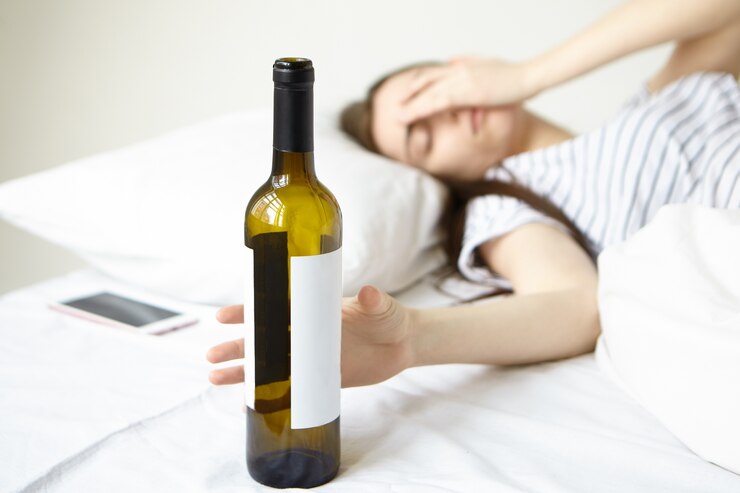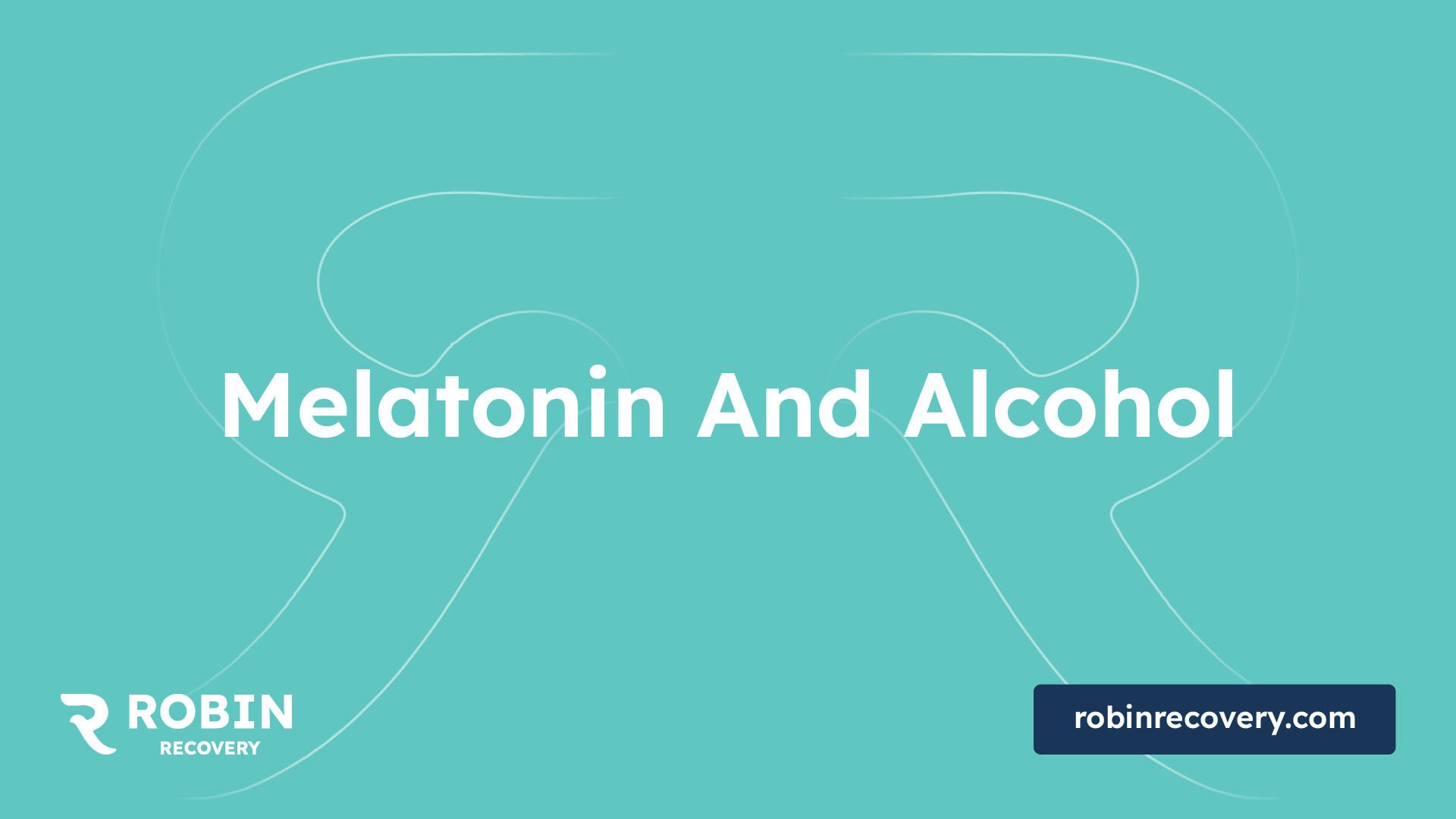Melatonin And Alcohol

Understanding Melatonin
Melatonin is a key component in the human body's internal clock and sleep cycle. Understanding its role and the effects of exogenous melatonin supplements is essential in the context of melatonin and alcohol interaction.

Role in Sleep Cycle
Melatonin is a naturally occurring hormone that plays a vital role in the regulation of the body's circadian rhythms, impacting the sleep-wake cycle. The body begins producing melatonin in the evening, around the time the sun goes down, stimulating feelings of sleepiness. Melatonin production continues into the night, peaking approximately seven hours after sunset. Once exposed to light in the morning, melatonin drops to undetectable levels, triggering wakefulness.
Exogenous Melatonin Supplements
In recent years, synthetic melatonin, also known as exogenous melatonin, has gained popularity as a sleep aid. Approximately two-thirds of American adults have taken melatonin supplements, with usage among children and adolescents also on the rise.
Exogenous melatonin taken about 30 minutes before bedtime may aid individuals who struggle to fall asleep by reinforcing circadian rhythms and signaling the body to sleep. However, it's worth noting that these supplements do not appear to effectively assist in maintaining sleep.
Melatonin supplements can prove beneficial for those with sleep disorders affecting their circadian rhythms, or for others with varying sleep disorders, although results may be variable and less impactful. In such cases, prescription medications may be necessary [1].
The use of melatonin supplements in children should be under the guidance of a doctor, as it may be appropriate for children and adolescents with specific sleep, behavioral, and developmental disorders. However, children under the age of 5 are rarely the right candidates for these supplements, and there has been an increase in accidental overdoses of melatonin supplements by children.
As such, understanding the role of melatonin and the use of its supplements is crucial when considering any potential interaction with alcohol.
Melatonin and Alcohol Interaction
Understanding the interaction between melatonin and alcohol is crucial for maintaining healthy sleep patterns and overall well-being. Both substances can have a significant impact on sleep, but when mixed, they can lead to a range of complications.
Effects of Mixing
Alcohol should not be taken with melatonin as they are not safe to mix. Alcohol can either weaken or strengthen the effects of melatonin and may lead to serious complications such as disrupting sleep patterns and reducing the effectiveness of melatonin [2].
Moreover, alcohol is known to reduce the amount of melatonin the body can create, causing interruptions in the sleep cycle [3]. It can also impact the breathing process by affecting airway muscles, making it hard to sleep especially for those with conditions like sleep apnea.
Notably, combining melatonin and alcohol can affect the liver's ability to create certain enzymes, leading to negative health effects and complications [3].
Risks and Complications
Mixing melatonin and alcohol can result in increased dizziness, anxiety, and trouble thinking clearly, posing potential risks such as difficulty walking and driving. Additionally, potential liver effects may occur due to the impact on the liver's enzyme production.
Regularly drinking alcohol can disrupt your circadian rhythm and worsen sleep quality. This disruption can lead to other health conditions such as depression, heart disease, diabetes, and obesity.
Given these risks and complications, it is advised that melatonin supplements and alcohol should not be mixed. It's important to consult with a healthcare professional before starting any new supplement regimen, especially if you regularly consume alcohol. They can provide personalized advice based on your specific health needs and conditions.
Benefits of Melatonin Supplements
Delving into the discussion of melatonin and alcohol, it's crucial to understand the benefits of melatonin supplements. These supplements have a significant impact on sleep disorders and regulation of circadian rhythms.
Sleep Disorders
Melatonin supplements are commonly used to manage various sleep disorders. Research has shown that these supplements may help people with insomnia fall asleep slightly faster. This is particularly beneficial for those with delayed sleep phase syndrome, a disorder characterized by falling asleep very late and waking up late the next day.
Furthermore, supplemental melatonin taken about 30 minutes before bedtime can reinforce circadian rhythms and signal to the body that it's time to sleep. However, it's worth noting that while melatonin supplements can help in falling asleep, they do not appear to be effective at helping people stay asleep.
Circadian Rhythm Regulation
In addition to assisting with sleep disorders, melatonin supplements play a crucial role in circadian rhythm regulation. Circadian rhythms, also known as our internal body clock, regulate the sleep-wake cycle. When these rhythms are disrupted, it can lead to sleep disorders and other health problems.
Melatonin supplements may benefit individuals with sleep disorders that affect their circadian rhythms. By reinforcing the body's natural sleep-wake cycle, these supplements can help manage the symptoms of circadian rhythm sleep disorders and improve overall sleep quality. However, it's important to note that results can vary, and prescription medications may be necessary for some cases [1].
In conclusion, while melatonin supplements provide several benefits, particularly in managing sleep disorders and regulating circadian rhythms, they are not a cure-all solution. Users should discuss with a healthcare provider to understand the best approach to their specific sleep concerns.
Dosage and Safety
When considering the use of melatonin supplements, it’s important to understand the appropriate dosage and potential risks and side effects, especially in the context of mixing melatonin and alcohol.
Recommended Doses
Melatonin supplements come in doses ranging from 1 mg to 10 mg. The appropriate dosage may vary depending on individual factors such as metabolism, health issues, age, and the specific reasons for taking the supplement. For sleep aid purposes, doses typically range between 0.1 mg and 5 mg.
For optimal results when trying to regulate sleep, it's generally recommended to take 1 to 3 milligrams of melatonin two hours before bedtime. To ease jet lag, the same amount of melatonin can be taken two hours before bedtime at the destination, starting a few days before the trip.
It is crucial to consult with a healthcare professional before starting any new supplement regimen. They can provide personalized advice on the appropriate dosage based on the individual's overall health, lifestyle, and specific needs.
Risks and Side Effects
While melatonin is generally considered safe for short-term use, potential side effects include drowsiness, headache, dizziness, and nausea. Some people may also experience mild anxiety or irritability.
One of the significant risks to be aware of is the potential interaction between melatonin and other substances, particularly alcohol. Mixing melatonin and alcohol can lead to increased drowsiness and potentially dangerous levels of sedation.
Moreover, it’s advisable to purchase melatonin from reputable sources due to variations in processing and packaging. Some products may not contain the amount of melatonin listed on the label, and others may contain additional ingredients that can interact with prescription medications.
Long-term use of melatonin has not been extensively studied, and the potential risks, side effects, and benefits are not fully understood. Therefore, it's recommended to use melatonin only under the supervision of a healthcare provider.
Additionally, creating optimal conditions for melatonin production by keeping the lights low can help promote sleep. Blue and green light from devices like computers and smartphones can neutralize melatonin's effects, making it harder to fall asleep.
In conclusion, while melatonin can be a helpful tool in managing sleep disorders or adjusting to a new time zone, it's important to use it safely and responsibly. Always consult with a healthcare provider before starting or changing a supplement regimen, especially if you are also consuming alcohol.
Considerations for Specific Groups
While the interaction of melatonin and alcohol is a topic of concern for all individuals, certain groups may need to exercise extra caution. These include children and adolescents, as well as older adults.
Children and Adolescents
Melatonin supplements are not usually recommended for children unless a doctor has specifically advised it. They may be considered for children and adolescents with certain sleep, behavioral, and developmental disorders. However, children under the age of 5 should rarely use melatonin supplements, and accidental overdoses by children have been on the rise.
Furthermore, the combination of melatonin and alcohol can lead to increased dizziness, anxiety, and trouble thinking clearly, with potential liver effects. This is particularly concerning for adolescents who may have access to both substances. Experts advise waiting 2-3 hours after consuming alcohol before taking melatonin as a sleep aid.
Older Adults
Older adults also need to be cautious when considering the use of melatonin supplements, especially in combination with alcohol. This group is at a higher risk for complications, including an increased chance of falling, car crashes, and accidental injuries.
Furthermore, certain health conditions prevalent in older adults may be negatively impacted by the use of melatonin. For example, individuals with autoimmune disorders, seizure disorders, depression, diabetes, or high blood pressure should avoid using melatonin supplements. Melatonin may raise blood sugar levels and increase blood pressure in individuals taking certain medications for hypertension.
In conclusion, while melatonin supplements can offer benefits for managing sleep disorders and regulating circadian rhythms, it's crucial to consider the specific risks and complications for different age groups. Always consult with a healthcare provider before starting any new supplement regimen, especially when other substances like alcohol are involved.
Tips for Optimal Sleep
Achieving optimal sleep goes beyond avoiding the combination of melatonin and alcohol. It involves creating a conducive environment for sleep and managing disruptions to your sleep schedule, such as jet lag.
Creating Sleep-Inducing Environment
Enhancing your sleep environment is a key step towards achieving high-quality sleep. Melatonin, the hormone that regulates your sleep-wake cycle, increases about two hours before bedtime. Creating optimal conditions for it by keeping the lights low can help promote sleep.
Avoiding blue and green light from devices like computers and smartphones is crucial as they can neutralize melatonin's effects. This means turning off these devices or using screen filters that reduce blue light emissions in the evening hours.
Moreover, it's important to note that regularly drinking alcohol can disrupt your circadian rhythm and worsen sleep quality, leading to other health conditions such as depression, heart disease, diabetes, and obesity. Therefore, limiting alcohol intake, particularly in the hours before bedtime, can significantly improve your sleep quality.
Jet Lag Management
Traveling across time zones can disrupt your sleep schedule, leading to symptoms of jet lag. Melatonin supplements can be used to ease jet lag by synchronizing your internal body clock with the time zone at your destination.
It is recommended to take 1 to 3 milligrams of melatonin two hours before bedtime at your destination, starting a few days before the trip. This helps to adjust your sleep schedule in advance and reduce the severity of jet lag symptoms.
However, combining melatonin with alcohol can be problematic and is not recommended. Both can cause drowsiness, leading to more severe sleepiness when combined, thereby disrupting the sleep schedule you are trying to establish [4].
In conclusion, achieving optimal sleep involves a delicate balance of various factors, including the careful use of melatonin, avoidance of alcohol, and the creation of a sleep-inducing environment. By following these tips, you can enhance your sleep quality and achieve a better, more refreshed state of health.
References
[1]: https://www.sleepfoundation.org/melatonin
[2]: https://www.medicalnewstoday.com/articles/319559
[3]: https://www.healthline.com/health/melatonin-and-alcohol
[4]: https://www.goodrx.com/well-being/supplements-herbs/alcohol-and-melatonin-interactions
[5]: https://www.hopkinsmedicine.org/health/wellness-and-prevention/melatonin-for-sleep-does-it-work
